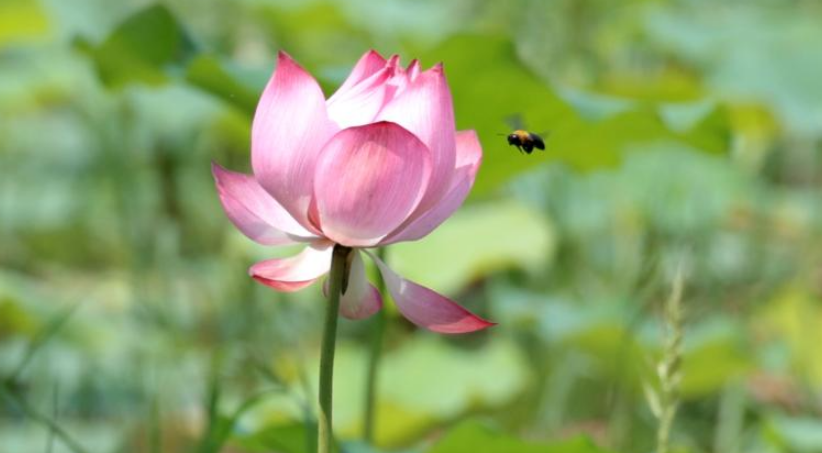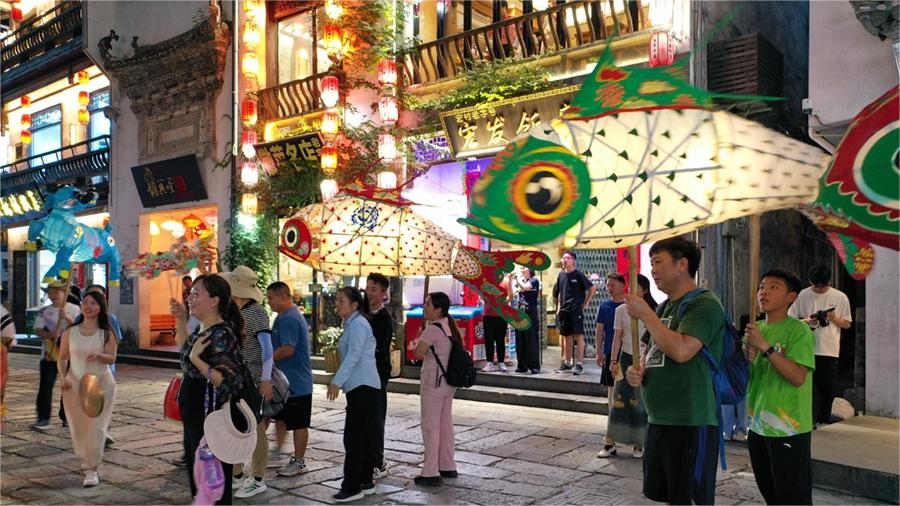Silkworm industry boosts rural revitalization in SW China’s Sichuan
Recently, silkworm farmers have been busy harvesting silkworm cocoons in Dongxing district, Neijiang city, southwest China's Sichuan Province.
Dongxing district, with a longstanding tradition of silkworm breeding, takes pride in its nationally recognized, high-quality silkworm cocoons. In recent years, the district has enhanced the quality and efficiency of the silkworm industry by leveraging technologies and exploring several silkworm rearing models, thus paving a wider path to prosperity for silkworm farmers.
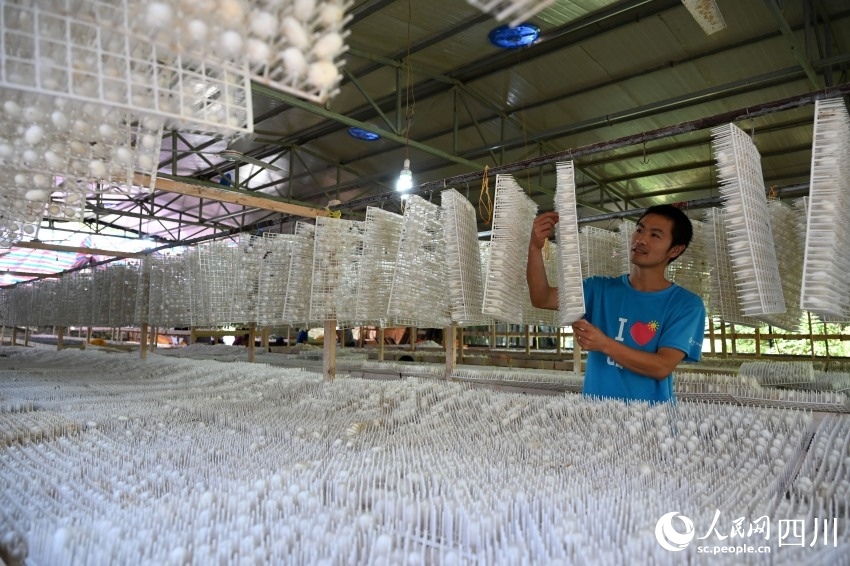
A farmer harvests silkworm cocoons in Dongxing district, Neijiang city, southwest China's Sichuan Province. (Photo/Lan Zitao)
Quality, yield, price all rise
Whether its quality, yield, or purchase price, this year's first batch of summer silkworms has surpassed last year, enabling more villagers to earn income close to home.
On the day of purchase at a collection station in Shuangqiao town, over 100 households delivered their silkworm cocoons. The average purchase price was 58 yuan ($8.15) per kilogram, slightly higher than that of previous years.
Qin Changrong, a villager in Shuangliu village, Shuangqiao town, said she earned 40,000 to 50,000 yuan from cocoon sales in the first half of this year. She has been raising silkworms for nearly 20 years and raises at least seven batches annually.
There are 18 communal rearers like Qin in Dongxing district, all of whom have rich experience and technical expertise in silkworm rearing. When they receive silkworm eggs, they rear young silkworms collectively in communal rearing rooms. They then distribute them to silkworm farmers when they reach the third instar stage. This communal rearing system saves labor, investment, and resources while ensuring high yields and quality, solving the problem of rearing young silkworms in rural areas.
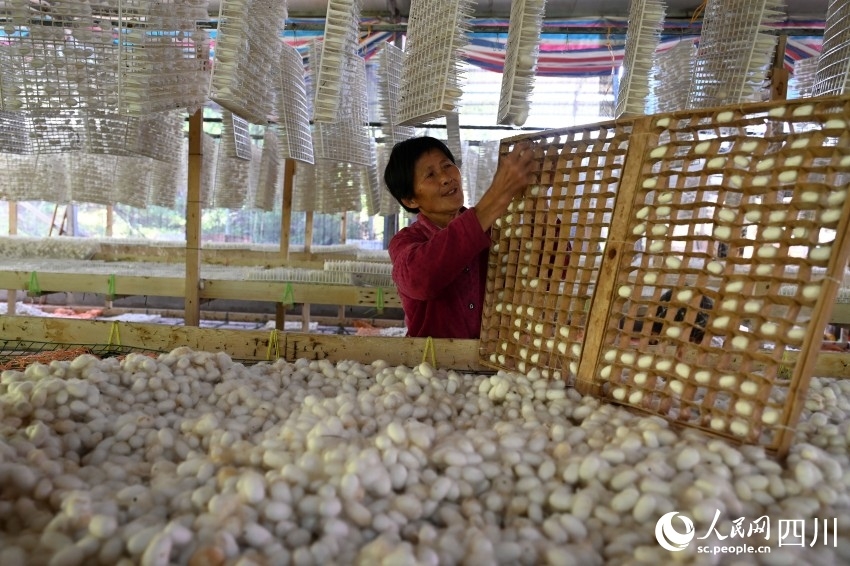
A farmer harvests silkworm cocoons in Dongxing district, Neijiang city, southwest China's Sichuan Province. (Photo/Lan Zitao)
Training and quality control
"Our mulberry trees are 10 years old. Everyone must pay attention when pruning; doing it well will ensure better growth," said experts from the Dongxing silkworm cocoon service center during a field observation and training event held in a mulberry garden in Shuangliu village. They explained mulberry cultivation techniques to silkworm farmers and village sericulture staff from surrounding towns and counties.
The event was the 10th centralized training session held in Dongxing district this year. In recent years, the district has implemented a three-level network service system involving sericulture center officials, town sericulture staff, and village sericulture staff, providing point-to-point guidance in fields and at silkworm farmers' homes.
This ensures comprehensive technical training and guidance services, transforming many novices into local experts and has allowed for the improvements in silkworm quality, yield, and price.
In 2024, the district's service center has organized 15 training sessions at the town and village levels, attracting over 1,200 participants and distributing more than 1,200 free technical manuals to silkworm farmers.
Currently, the district has over 23,000 mu (1,533.3 hectares) of mulberry fields and about 1,000 households engaging in silkworm rearing. The annual total output value of the silkworm cocoon industry exceeds 90 million yuan in the district.
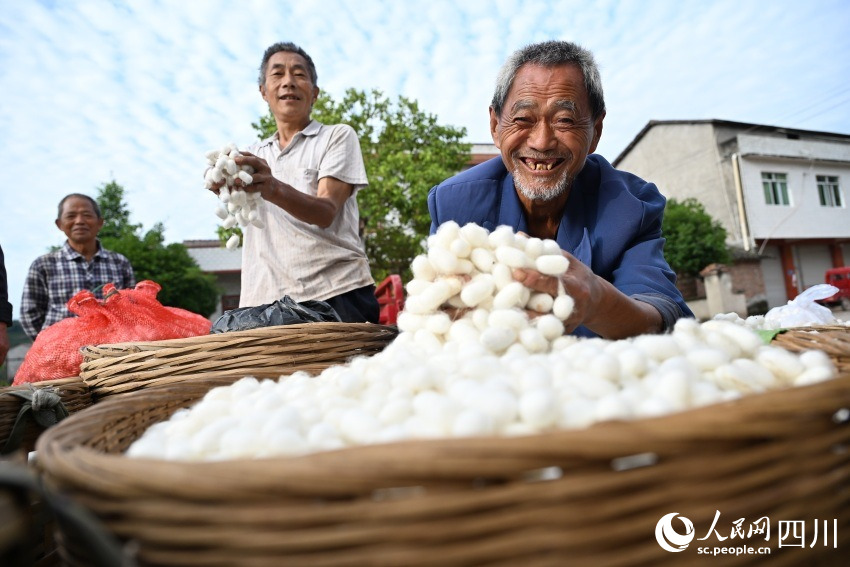
Farmers display silkworm cocoons with big smiles in Dongxing district, Neijiang city, southwest China's Sichuan Province. (Photo/Li Jianming)
Integration and diversified development
In the last few years, Dongxing district has taken advantage of its silkworm industry and branched out into the mulberry industry. The district has begun to sell mulberries, medicine, health products, edible fungi cultivated on mulberry branches, mulberry wine, and other products. This has injected new momentum into rural revitalization in the district.
The district's Yuanxianqiao modern agricultural park has cultivated over 120,000 sticks of edible fungi grown on mulberry branches, earning nearly 1.2 million yuan in extra income. The park plans to cultivate a total of 500,000 sticks of the fungi in 2024, which is expected to generate an additional income of 5 million yuan.
Notably, the pilot breeding of Bombyx Batryticatus (dried larva of silkworms) was successful in May, opening up another avenue for silkworm farmers to increase their income. Bombyx Batryticatus is a traditional Chinese medicinal ingredient with multiple healing properties.
The district has established two pilot bases of Bombyx Batryticatus this year, said Li Yanxia, director of Dongxing district's silkworm cocoon service center, adding that it plans to raise 12 batches of Bombyx Batryticatus this year, potentially generating 2 million yuan in annual output value.
Photos
Related Stories
Copyright © 2024 People's Daily Online. All Rights Reserved.








